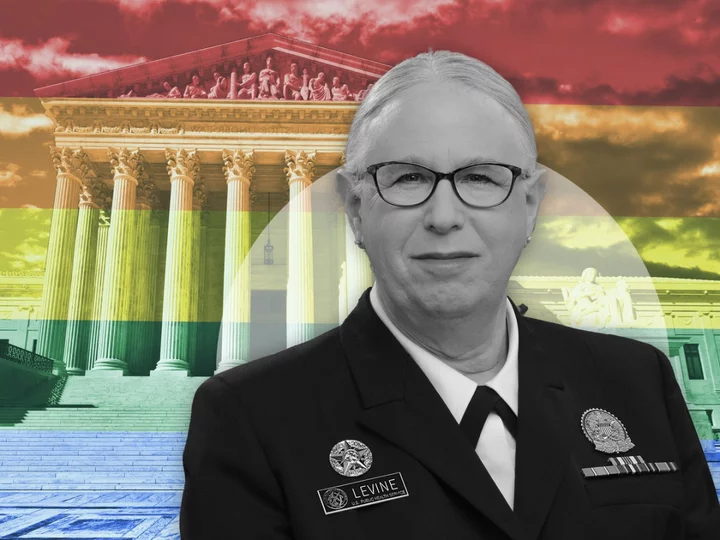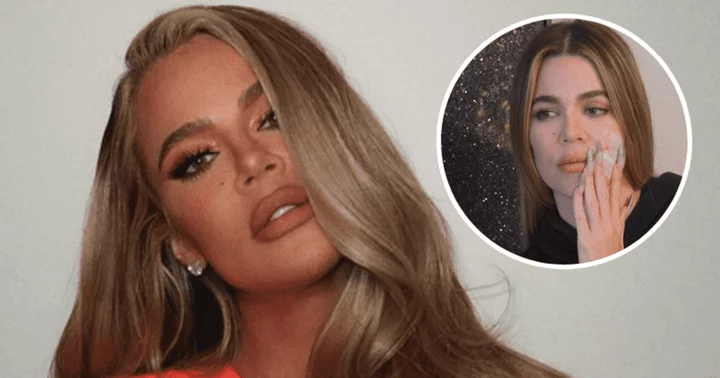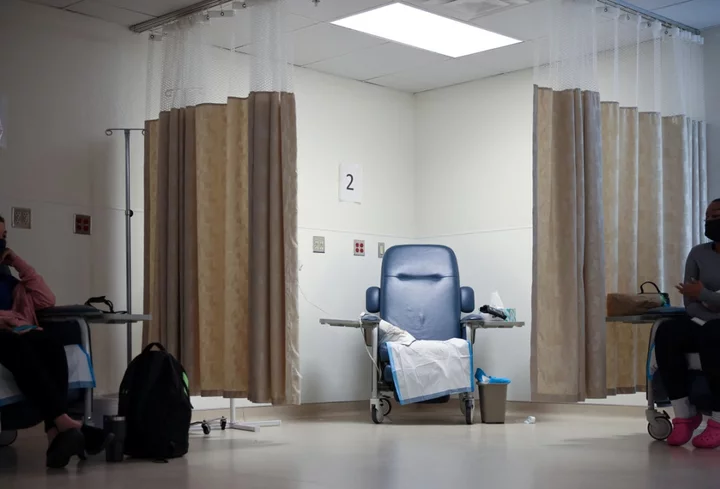
The 25 Best Children’s Books of All Time
The best children’s books of all time include works by J.R.R. Tolkien, Maurice Sendak, Louisa May Alcott, and more.
2023-06-02 04:28

Senate passes bill to block Biden's student loan forgiveness program
Both the Senate and the House have now passed a bill to block President Joe Biden's student loan forgiveness program, which promises to cancel up to $20,000 of debt for millions of borrowers but has been held up by courts.
2023-06-02 02:45

Rachel Levine on Congress bigots, Don’t Say Gay and life as Biden’s top trans official: ‘Despair doesn’t motivate change’
"I'm not the best person for hobbies," says Dr Rachel Levine. In her 40 years of practicing medicine, four of which were spent running the health department of the state of Pennsylvania, she has rarely had much time for recreation. Now she is not only the assistant secretary of state for health for the whole United States under president Joe Biden, but also the most senior openly transgender government official in American history. More than that, she has taken a strong line supporting trans children and transition healthcare at a time when they are under unprecedented attack. According to the non-profit Human Rights Campaign, 19 states have banned transition healthcare for under-18s, and eight more are considering doing so. Meanwhile, medics and patients – including at Boston Children's Hospital, which established the nation's first trans health programme for children and adolescents in 2007 – have received a storm of harassment and threats. "I know the people who developed that clinic. I know them all personally," says Levine, 65, who grew up in Massachusetts and still speaks with a touch of New England in her accent. "I remember when that clinic was formed... now it's under siege by people with political and ideological motivations. "So we need to support trans youth, we need to support their families and we need to support these expert providers that are providing this careful, intentional care according to well-established evidence-based standards." Levine is speaking to The Independent via Zoom from her office in Bethesda, Maryland, flanked by flags, her white hair tied tightly behind her head. As a four-star admiral in the US Public Health Service Commissioned Corps, she wears military-style blue overalls modeled on those of the US Navy and Coast Guard. She does not, she explains, consider herself to be a politician. She has never run for or been elected to office. Instead she sees herself as simply a doctor and a public servant, who now has a rare ability to advocate for her community, as well as overseeing public health areas raging from abortion rights through long Covid to the unequal impact of pollution and natural disasters. But politician or not, her identity has made her a lightning rod for criticism and, sometimes, viotriolic bigotry from anti-trans conservatives. Her name is a fixture in online extremist spaces, where her appointment is painted as part of a conspiracy to overturn traditional gender roles. "When I receive that pushback, I sublimate it," she says, using the psychological term for turning a negative mental energy towards useful ends. "I am a positive and optimistic person because I choose to be positive and optimistic. I can be pessimistic and in despair, but that doesn't motivate change." ‘Trans healthcare is medicine like any other’ Born in 1957, Levine attended an all-boy's school near Boston and studied medicine at Harvard and Tulane University, before completing her training at a hospital in New York City where she specialised in paediatrics and psychology. In 1993, in what she has called her wryly called "most difficult transition", she moved southwest to become a professor at the Penn State, a position she still holds today. In 2015, however, her life took a different turn when Pennsylvania's incoming Democratic governor Tom Wolf asked her to co-chair his health policy transition team and then to be his physician general – a job that would put her right in the merciless gaze of national politics and media. Four years earlier, after decades of "compartmentalising" her feelings, Levine had come out as a trans woman in her fifties. Yet although the backlash against trans rights was already in the offing, her appointment was unanimously confirmed by the state legislature, later becoming Pennsylvania's health secretary and leading its response to Covid-19. Her US Senate confirmation hearing in 2021 was another matter. Republican senator Rand Paul asked her whether children were capable of consenting to medical transition, falsely describing sex reassignment surgery as "genital mutilation". All 50 Democrats and two Republicans voted to confirm her, while the other 48 Republicans voted against. "My confirmation hearing was – interesting," says Levine now, with only the shortest pause, "but not unexpected, and so I was able to navigate that." She adds that although she doesn't deal frequently with Congress, most politicos have treated her "respectfully". As a paediatrician, Levine argues that treatments such as puberty blocking drugs and hormone replacement therapy (HRT) for under-18s should be treated just any other childhood medicine. (Breast removal surgery is rarely prescribed for trans teenagers, and never for younger children, while genital surgery for under-18s is almost unheard of). "Transgender care for youth is medical care; it is mental health care; it is literally suicide prevention care," says Levine. "And it is based upon a well-established standard of care which continually gets updated, as all standards of care do... "It always needs to be done carefully, usually with national or international standards, and then it's individualised to the patient and the family. That's how we do paediatric care. It is no different for transgender medicine." One supportive adult can make the difference Critics of medical transition sometimes liken gender dysphoria – that is, feelings of discomfort or horror related to one's gender – to eating disorders, arguing that both involve an irrational aversion to one's natural body. Levine, who is an expert on eating disorders, pooh-poohs that idea, saying the causes of and solutions to each condition are completely different. Although young trans people do have worse mental health on average than the US population, she says evidence shows that is not caused by being trans but by the way they are being treated by others – a problem exacerbated by anti-trans laws and rhetoric. "Young people who receive support and standard of care treatment have excellent mental health outcomes," she says. "They have depression and anxiety because they're being harassed and bullied, and they're not being allowed to transition. If you facilitate them being who they are, their mental health gets better." Nor is there any evidence, she says, for a theory widespread among anti-trans activists: that young people are being falsely persuaded that they are trans by "social contagion" from their peers. She describes an often-touted 2018 paper by medicine professor Lisa Littman, proposing that trans children may be suffering from "rapid onset gender dysphoria" (ROGD), as "flawed". A group of medical organisations including the American Psychological Association and the American Psychiatric has since warned against applying the concept of ROGD in clinical contexts, describing it as based on "unsupported claims" and likely to "stigmatise" trans people. Littman corrected her paper in 2019 after intense criticism of its methods, and the journal that published it issued an apology. "All the evidence really points to better communication and understanding about gender identity among young people, so that they understand who they are and they come out," says Levine. "There's a lexicon, there's a language, there's support. And more parents understand, and there has been more availability of treatment, and there still is availability of treatment." All of those are things Levine herself never had as a child. "I grew up in the Sixties and Seventies," she says. "There was no terminology, there was no internet, there was no Google. And so I did not understand the thoughts and feelings I was having about gender identity." Even though she had supportive adults in her life, she says there was no way to ask them about being trans because the concept was so unknown. "Who are you going to tell? And what would you have said? None of the language was there." Today she frequently touts a study by The Trevor Project, an American LGBT+ support charity, showing that having even one adult in their life who supports their gender identity can meaningfully lower a young trans person's likelihood of attempting suicide. It is why she is so concerned about Florida's so-called "Don't Say Gay" law and other similar laws, which ban teachers from discussing LGBT+ issues in public schools. "That one supportive adult might be a parent or a relative, but it might not," says Levine. "It might be a teacher, or a coach, or guidance counsellor, or someone else in the community that makes that difference... "[Florida's law] makes it so difficult for a young person to be able to talk to, potentially, that teacher or that coach or that guidance counsellor, because that person then has to immediately tell the young person's parents by that state law." While Republican state legislators seek to pass laws that would make it more difficult for trans people to get healthcare, work in education, or exist in public, a few figures have explicitly called for violence. One GOP candidate last year called for supporters of trans rights to be tried and executed for treason, while a conservative pastor said LGBT+ people should be “lined up against the wall and shot in the back of the head”. ‘Most people in the country don’t hate us’ Some trans people and supporters see all this as a potential precursor to genocide, accusing opponents of wanting to "eliminate" trans people from society by making transition all but impossible. Machaela Cavanaugh, a progressive state legislator in Nebraska, told The Independent last month that trans healthcare bans were a form of "extermination". Does Levine agree? "I would not characterise it as that," she says, although she adds: "I understand the feelings of people who say that, given the hateful rhetoric and the laws and actions being taken." There are many people in the public who have been misled, and I think they are able to be educated about the truth Rachel Levine She likewise rejects the more adversarial approach to fighting for LGBT+ rights that is pithily summarised in the slogan "the first Pride parade was a riot". Instead she sees Pride Month as an opportunity for "advocacy" – for trans people to tell their stories and help educate those who do not understand their lives. The reason, she claims, is that true bigots are merely a "vocal minority", part of a coordinated campaign by conservative think tanks and politicians who lost the argument against gay marriage and are now looking for the next "wedge issue" to divide the electorate. "We're probably not going to change their minds," she says. "But then there are many people in the public who have been misled, and I think they are able to be educated about the truth." She cites the trans author Jennifer Finney Boylan, who wrote that "it's impossible to hate anyone whose story you know", as well as the Jedi master Yoda, who intoned: "Fear leads to anger; anger leads to hate; hate leads to suffering." In other words, people fear what they don't understand – and if they understand more about actual trans people rather than the demonic caricatures of anti-trans invective, they won't go down that path. "I think this is a significant setback, which happens on the road to equality and fairness and freedom. We have seen this in many other times," she says. "So I do not think it will stand, and I think the wheel will turn. "But I do freely admit that it is very difficult and very challenging for members of our community... I think that we are strong, and I think that we are resilient, and I think that we are strong." She pauses for a moment. "But I have to tell you, I choose to believe that." Not all LGBT+ activists feel the same way. Some have accused the Biden administration not doing enough to stem the tide of anti-trans bills, while others have attacked its recent guidance on trans participation in school sports as a surrender to conservatives. Yet Levine is confident that President Biden "supports our community unconditionally", and says there has never been such strong solidarity with LGBT+ people at the top levels of any US government. She cites the President's 13-point executive order last Pride aiming to curb anti-LGBT+ discrimination, the health department's action against conversion therapy, and her work with the Office of Civil Rights to reverse Trump-era changes that weakened rules against discrimination in healthcare. At age 65, she has already seen transgender people go from complete social pariahs, living in the shadows of a society that made no provision for them, to having access to medical transition and at least a chance – sometimes a good chance – of being fulfilled and successful while being open about who they are. So if and when she does have time for hobbies again, what would she do? "I would like to have more time to meditate," she says. "I have meditated in the past and it's pretty hard to add it to my current day, but I have found mindfulness and meditation to be very helpful." Hikes and long walks, too, would be on her agenda. "I used to run," she adds, a little wistfully. "Now I walk." Read More Thousands march in Jerusalem Pride parade, first under Israel's most right-wing government ever LGBT+ flags vandalised for a fourth time at Canada church on eve of Pride Month LGBTQ+ people flock to Florida for Gay Days festival Pride profile: I will be the first asexual grand marshal at NYC’s Pride March Rufus Gifford: The gay man serving as the ‘American welcome’ to foreign leaders Kershaw disagrees with Dodgers’ decision to reinstate gay ‘nun’ group for Pride Night
2023-06-02 01:29

Gap settles Patagonia trademark lawsuit over 'iconic' pocket design
By Andrew Goudsward Outdoor clothing retailer Patagonia Inc has settled its lawsuit accusing Gap Inc of illegally copying
2023-06-02 00:48

'Little Mermaid' alleged 'review bombing' prompts rating system change by IMDb
The live-action remake of "The Little Mermaid" stirred strong reaction before production even began on the film, and that has continued since the movie's debut in theaters last week.
2023-06-02 00:17

Tan France welcomes second baby with husband Rob France via surrogate
Queer Eye star Tan France and his husband Rob France have welcomed their second baby together via surrogate. The 39-year-old reality TV star confirmed the birth of their son, Isaac, on Instagram. “Welcome baby boy #2, Isaac France, born this past weekend. He completes our little family perfectly,” he captioned the post, which featured the new family of four. The Next in Fashion host also shared his thanks for their surrogate, writing, “And a huge thank you to our incredible warrior of a surrogate, for giving us the greatest gift one could ever give.” In the comments, France’s fellow Queer Eye co-stars rushed to congratulate the couple on their newest addition. Bobby Berk wrote, “My babies havin babies,” while Karamo Brown said: “So happy for the world to meet your new beautiful baby!!! What a blessed family!” “Awee Tannay!!!! Cutest family,” commented Jonathan Van Ness. France announced on 13 April that he and his illustrator husband were welcoming a new addition to their family summer. In August 2021, the parents welcomed their eldest son, Ismail, who was born prematurely. In a video clip posted to Instagram, France revealed that the couple have been wanting to expand their family for a “long time”. “Hard to believe it was two years ago today we announced Ismail was on his way! And today – we couldn’t be prouder to share that he’s going to be a big brother!” France captioned the post. “Becoming dads has been our greatest joy, and we are so excited to grow our family with the help of our wonderful surrogate.” The British-American fashion designer previously recalled the moment he and his husband learned their surrogate was pregnant last December. “We were over the moon,” France said in an interview with People in April. “It was the best feeling ever. I mean, it felt almost as shocking as the first time. I was overjoyed, in tears, I couldn’t believe that it had finally happened again. It was just the most incredible feeling.” France explained that the couple decided to have another child because they wanted their son Ismail to have a built-in best friend that was also close in age. "We wanted him to have someone that will be his person that he’s tethered to,” France told the outlet. “I’m really close with my siblings and my husband is really close with his, so we wanted to create a family where [our child] would have more support other than just Rob and I.” He added the most exciting part about expecting another baby is that Ismail will “have somebody hopefully for the rest of his life that he gets to call his person”. While he revealed that the couple already know the sex of their unborn baby, they won’t be sharing it with fans just yet. However, the two have already picked out a name for baby number two. Speaking to People, France also gave insight into the couple’s “wonderful” relationship with their surrogate, whom he praised as an “incredible woman.” “The only thing that’s different is that she’s out of state,” said France, who lives in Salt Lake City, Utah. “So we don’t get to see her in real life as much, but we see her on FaceTime or Zoom. We text regularly, and so it’s been great.” In August 2021, Tan France and husband Rob welcomed their eldest child Ismail seven weeks earlier than his due date. The newborn spent three weeks in the NICU (newborn intensive care unit) before he was taken home. “Give our son a warm welcome,” France captioned a photo of the parents smiling with their son. “Ismail France, born July 10th.” “He came seven weeks early, so he’s been in the NICU for the past three weeks,” he wrote. “But, today, we finally got to bring him home. We love him so, so much. Like, fully obsessed.” France added that their surrogate was “doing so great” post-labour and they “couldn’t be more grateful for the greatest gift in our lives.” Read More Tan France reveals his grandfather used to make knockoff Disney products Queer Eye’s Tan France welcomes first child after surrogate gives birth seven weeks early Queer Eye’s Antoni Porowski engaged to boyfriend Kevin Harrington How a hay fever medication transformed my life Dermatologist horrifies viewers by discussing mites that live in your skin ‘Unsupportive backgrounds’ make LGBT+ youth twice as likely to have suicidal thoughts – report finds
2023-06-01 21:46

Does Khloe Kardashian have cancer? 'The Kardashians' star deals with alarming diagnosis on Hulu show
'Learning that it was melanoma was obviously really scary and I just hope that everything's gonna be OK,' says Kylie Jenner
2023-06-01 21:22

Khloe Kardashian says what she thought was a zit turned out to be melanoma
Khloe Kardashian has revealed that what she thought was a zit on her face turned out to be melanoma. Kardashian, 38, and her family navigate the implications of the diagnosis during the latest episode of The Kardashians, a Hulu series that follows the high-profile members of the celebrity Kardashian-Jenner family. “Khloe has a little bit of a history with melanoma and cancerous lesions, so this on her face is very concerning to me,” Khloe’s mother Kris Jenner, 67, says to her step-sister Kylie Jenner, 25, during the episode. Kylie responds that her older sister had “this little bump and she was trying to remove it, and she’s like, ‘it just won’t go away,’ so to find out it’s melanoma is obviously really scary and I just hope that everything’s gonna be OK.” Kardashian decided to have a biopsy on the bump on her face, despite thinking it was a “zit”. “I have done one biopsy on this bump that I just assumed was a zit, turns out it’s not a zit,” she says during the episode. “It’s melanoma and for my age, it’s incredibly rare.” Melanoma is a type of skin cancer that can spread to other areas of the body, according to the NHS. The main cause of melanoma is ultraviolet light, which comes from the sun and is used in sunbeds. “Melanoma is deadly,” Kardashian said in a trailer for the show. “This is way more serious than I anticipated it to be.” Factors that increase the chances of getting melanoma include age and having pale skin, a large number of moles and a family history of skin cancer. Karshasian first opened up about her skin cancer scare in October 2022 and shared the news on her Instagram Story, featuring close-up photos of her skin. She said at the time that she was “grateful” that the margins now “appear clear” and she was in the “healing process”. “So, here we are… you’ll continue to see my bandages and when I’m allowed, you’ll probably see a scar (and an indentation in my cheek from the tumour being removed) but until then I hope you enjoy how fabulous I’m making these face bandages look.” Kardashian also urged her followers to get frequent checkups by recounting a past incident where doctors found a cancerous mole on her back. “At 19 years old, I had melanoma on my back, and I had a surgery to remove that as well, so I am pre-composed to melanomas,” she said of that experience. “Even those who are not, we should be checking all the time.” “I am someone who wears sunscreen every single day religiously so no one is exempt from these things. Please take this seriously and do regular self-exams as well as your annual checkups.” The Kardashians season three is streaming on Hulu now. Read More Triathlete proudly shares ‘beautiful’ racing photo where she bled through swimsuit while on her period Parents defend Nick the Fairy Godmother’s apprentice at Disneyland after viral video Jodie Marsh takes swipe at Phillip Schofield years after heated This Morning clash Khloe Kardashian praised for ‘honesty’ after opening up about surrogate pregnancy Khloe Kardashian’s best friend appears to confirm name of reality star’s son Khloe Kardashian criticises ‘narrative’ that she’s dating ex Tristan Thompson again
2023-06-01 15:47

Madonna has 2 new songs out this month with Sam Smith and The Weeknd
Madonna and Sam Smith are releasing 'Vulgar', while she has assisted The Weeknd on 'Popular' from 'The Idol'.
2023-06-01 15:20

DeSantis floats new policy proposals on student loans and military readiness
Hitting the campaign trail in Iowa on Wednesday for the first time as a presidential candidate, Florida Gov. Ron DeSantis road tested new policy ideas for handling student debt and boosting military morale.
2023-06-01 07:23

First installment of new Obama oral history project focuses on climate
A new oral history project focused on former President Barack Obama's administration was released on Wednesday, with the first installment centering on climate.
2023-06-01 07:23

Oklahoma’s Supreme Court struck down two abortion bans. But a 113-year-old law is severely restricting access
Weeks before the US Supreme Court overturned Roe v Wade last year, Oklahoma’s Republican governor vowed to “outlaw” abortion in the state entirely, and pledged to sign any legislation that promised to do just that. Governor Kevin Stitt signed several anti-abortion bills into law, including a measure that outlaws abortion at roughly six weeks of pregnancy, and another banning all abortions with exceptions only to save the patient’s life in a medical emergency or if the pregnancy is the result of rape, sexual assault or incest that has been reported to law enforcement. On 31 May, the highest court in the state struck down both of them. But abortion access remains out of reach for most patients in the state, after that same court upheld a far-reaching abortion ban from more than 100 years ago earlier this year. A state law from 1910 makes it a felony punishable up to five years in prison for anyone to perform or help someone seek an abortion unless to save the patient’s life. “This ruling, while providing clarity in emergency situations, does not change the landscape of care significantly,” Emily Wales, president and CEO of Planned Parenthood Great Plains, said in a statement. Oklahoma was the first state in the US to successfully outlaw abortion despite a constitutional right to abortion care that was affirmed by Roe v Wade. But in March, the state’s Supreme Court ruled that the state’s constitution “creates an inherent right of a pregnant woman to terminate a pregnancy when necessary to preserve her life,” though the court declined to weigh in on whether the constitution protects abortion access in other circumstances. The court also ruled that doctors should be able to use their own medical judgment to determine whether to provide an abortion when a patient’s life is at risk “due to the pregnancy itself or due to a medical condition that the woman is either currently suffering from or likely to suffer from during the pregnancy.” But it also preserved the 1910 law, a 113-year-old ban on abortion care that threatens providers with prison. The court’s decision on 31 May reaffirmed its decision recognising a right to abortion care in life-threatening cases, and struck down two the overlapping bans. In the months after the Supreme Court’s decision in Dobbs v Jackson Women’s Health Organization, which struck down a constitutional right to abortion care, clinics in Oklahoma have been forced to close, and patients have traveled thousands of miles for legal abortion care in a region surrounded by states where abortion is severely restricted or effectively outlawed. Even in cases of emergencies, there appears to be no hospital in Oklahoma that provides “clear, consistent policies for emergency obstetric care to pregnant patients,” according to an April report from Physicians for Human Rights, Oklahoma Call for Reproductive Justice and the Center for Reproductive Rights. Oklahoma hospitals “offered opaque, contradictory, and incorrect information about abortion availability and approval processes in obstetric emergencies, as well as little reassurance that clinicians’ medical judgment and pregnant patients’ needs would be prioritized,” according to the report. Only two out of 24 hospitals described providing legal support for providers in such situations, and representatives for three hospitals claimed their facilities do not provide abortions at all, the report found. Abortion rights advocates welcomed the court’s decision on 31 May, which abortion rights advocates said will at least allow doctors to clearly rely on their own medical judgment to provide care when a patient’s life is in jeopardy. “After months of uncertainty and chaos, Oklahomans should finally be able to access the life-saving care they need in their home state,” according to Dr Alan Braid, an abortion provider and plaintiff in the case challenging the overlapping abortion bans. “Heartbreakingly, we were forced to close our Tulsa clinic due to Oklahoma’s abortion bans, but I will continue to serve patients in the region at clinics in Illinois and New Mexico,” he added. “While we are relieved the court upheld the right to abortion in medical emergencies, this does not diminish the fact that care remains out of reach for the majority of Oklahomans,” according to Ms Wales. Following the state Supreme Court decision on 31 May, Oklahoma Attorney General Gentner Drummond clarified that “except for certain circumstances outlined in that statute, abortion is still unlawful in the state of Oklahoma” because of the 1910 law. Governor Stitt accused the court of using “activism to create a right to an abortion in Oklahoma.” “This court has once more over-involved itself in the state’s democratic process, and has interceded to undo legislation created by the will of the people,” he said in a statement. Within the last year, more than a dozen states – including most of the entire US South – have outlawed abortion care for most pregnancies. Read More ACLU sues Nebraska over combined law targeting abortion and gender-affirming care: ‘Egregious overreach’ South Carolina judge halts six-week abortion ban as state Supreme Court set to review new law Doctor who provided abortion care to 10-year-old rape survivor reprimanded in case that drew national scrutiny Anti-abortion laws harm patients facing dangerous and life-threatening complications, report finds
2023-06-01 07:22
